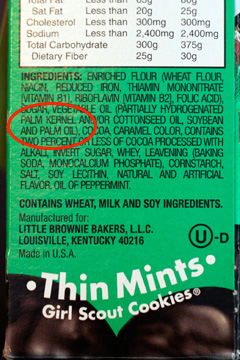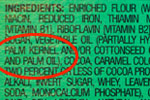 Deforestation in Riau, Sumatra.
Deforestation in Riau, Sumatra.
After a campaign waged by two charismatic Girl Scouts over questionably-sourced palm oil used in Girl Scout Cookies, Kellogg Company today announced a policy that will move it toward deforestation-free palm oil.
Under the commitment, Kellogg’s suppliers will have to meet specific sourcing criteria by the end of 2015.
“Kellogg will require all global palm oil suppliers to trace palm oil to plantations that are independently verified as legally compliant; adherent to the company’s principles for protecting forests, peat lands, and communities; and compliant with all Roundtable on Sustainable Palm Oil (RSPO) principles and criteria,” said the cereal giant in a statement.
“As a socially responsible company, traceable, transparent sourcing of palm oil is important to us, and we are collaborating with our suppliers to make sure the palm oil we use is not associated with deforestation, climate change or the violation of human rights,” said Diane Holdorf, Kellogg Company Chief Sustainability Officer.
By establishing a traceability requirement and mandating a segregated supply of certified palm oil, Kellogg has gone beyond what many other companies in the sector have signed off on: commitments to buy GreenPalm certificates representing palm oil certified under the Roundtable on Sustainable Palm Oil (RSPO). While the purchase of GreenPalm certificates helps support more responsible palm oil production, oil from non-certified palm oil still ends up in companies’ supply chains, leaving them open to criticism from environmental groups. By 2016 Kellogg’s will be able to assure customers that it isn’t using palm oil produced at the expense of wildlife-rich forests.

 Land-clearing fires set for establishing oil palm plantations in Riau, Sumatra. Photos taken by Rhett A. Butler in February 2014.
Land-clearing fires set for establishing oil palm plantations in Riau, Sumatra. Photos taken by Rhett A. Butler in February 2014.
The pledge came after Kellogg worked with Green Century Capital Management, a fund that holds shares in the company.
“Green Century is excited to support Kellogg on this important palm oil journey, which will ensure the company’s core values are upheld throughout the supply chain and create long-term value for both shareholders and the environment,” said Lucia von Reusner, Shareholder Advocate, Green Century Capital Management. “Kellogg Company’s commitment to directly engage its suppliers positions them as a leader in developing sustainable palm oil.”
 Palm oil is now found in up to half of packaged processed foods, including Girl Scout cookies. By virtue of its high yield, palm oil is a cheaper substitute than other vegetable oils. In an effort to reduce costs, some candy makers are using palm oil in place of cocoa butter in their milk chocolate products. Photo by Rhett A. Butler |
Kellogg’s decision was immediately welcomed by the Union of Concerned Scientists, which is campaigning to clean up the palm oil industry.
“This is a gold star day for Kellogg’s. Their efforts to source sustainable deforestation-free palm oil will help pull the industry towards palm oil that is deforestation-free,” said Sharon Smith, Campaign Manager with UCS’s Tropical Forest & Climate Initiative, in a statement. “The commitment goes on to address peatlands, carbon-rich areas of decayed vegetation. Kellogg’s expressly notes that it will work to protect peatlands and not develop these areas, period. We were also pleased to see the Kellogg’s intends to guard High Carbon Stock forest, areas storing a great deal of carbon.”
“We hope that the commitments Kellogg’s outlined soon become industry requirements. We’d like to see all palm oil producers making oils with these values and companies walk away from suppliers that cannot prove their palm oil is deforestation-free, peat-free and conflict-free.”
Palm oil production is one of the largest drivers of deforestation in Southeast Asia, but pressure from environmentalists has recently led several prominent buyers like Kellogg’s to adopt safeguards for sourcing palm oil, which is used in a variety of snack foods, cosmetics, and soaps. Those policies have now pushed two major suppliers in Asia — Golden Agri-Resources (GAR) and Wilmar — to commit to eliminating deforestation from new plantation development.

Mother Sumatran orangutan with baby in Gunung Leuser, North Sumatra..
In the case of Kellogg’s, its sourcing practices were heavily criticized during a campaign by Rhiannon Tomtishen and Madison Vorva, Girl Scouts who challenged their organization for its use of palm oil in Girl Scout cookies, which are produced by a subsidiary of Kellogg Company. By highlighting deforestation and threats to endangered species like orangutans from oil palm plantations, Tomtishen and Vorva catalyzed a movement that eventually forced Girl Scouts USA to commit to sourcing palm oil from less damaging sources.
Related articles
3.5 million ha of Indonesian and Malaysian forest converted for palm oil in 20 years

(11/12/2013) Some 3.5 million hectares (8.7 million acres) of forest in Indonesia, Malaysia, and Papua New Guinea was converted for oil palm plantations between 1990 and 2010, finds a comprehensive set of assessments released by the Roundtable on Sustainable Palm Oil (RSPO). The research, conducted by an international team of scientists from a range of institutions, is presented in a series of seven academic papers that estimate change in land use and greenhouse gas emissions from oil palm expansion in the three countries, review the social and environmental impacts of palm oil production, forecast potential growth in the sector across the region, and detail methods for measuring emissions and carbon stocks of plantations establishing on peatlands.
Girl Scouts activists win forest heroes award for challenging organization on sustainability
(02/10/2012) The United Nations on Thursday honored five ‘Forest Heroes’ for their contributions toward protecting forests.
After protracted campaign, Girl Scouts pledges to cut out some palm oil

(10/02/2011) Girl Scouts USA has announced that it will lessen palm oil in its ubiquitous cookies by using alternatives when possible and cutting overall usage. The organization also committed to purchasing GreenPalm certificates for all of its palm oil in order to financially support more environmentally sustainable palm oil, even if the palm oil in the cookies is not.
Greening the world with palm oil?

(01/26/2011) The commercial shows a typical office setting. A worker sits drearily at a desk, shredding papers and watching minutes tick by on the clock. When his break comes, he takes out a Nestle KitKat bar. As he tears into the package, the viewer, but not the office worker, notices something is amiss—what should be chocolate has been replaced by the dark hairy finger of an orangutan. With the jarring crunch of teeth breaking through bone, the worker bites into the ‘bar’. Drops of blood fall on the keyboard and run down his face. His officemates stare, horrified. The advertisement cuts to a solitary tree standing amid a deforested landscape. A chainsaw whines. The message: Palm oil—an ingredient in many Nestle products—is killing orangutans by destroying their habitat, the rainforests of Borneo and Sumatra.